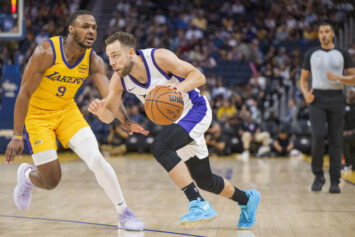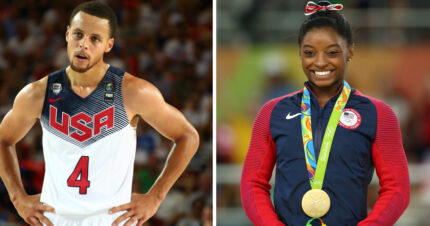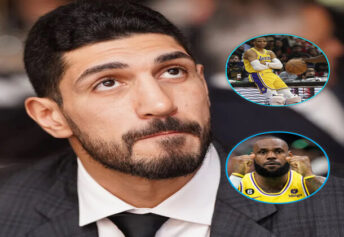I want to have a conversation with all the basketball analysts, national panelists, and everyone in the basketball community from social media mouths to high school and college players, NBA players, executives and owners, former and current.
The NBA game has evolved. We went from playing basketball with no shot clock in college and high school basketball. No three-point line to a three-point line now being so important to game strategy. You had lines that were moved inside the paint. The defense has changed from in your face, smash mouth D to no hand checking and touch fouls.
The center position, once the most coveted position on the court, has been eliminated in favor of small ball. There have been so many adjustments and rules changes based on the kind of culture the league wants to have and what players it wants to market, etc. It’s almost impossible to compare the greatest player from each era.
The media does it all the time, however, and it’s distorted epic proportions when discussing GOAT candidates.
NBA In The 1960s: Era Of The Dominant Big Man
In the 60s you had Bill Russell, who was dominant in terms of winning championships. The first of his kind. The leader of a franchise, a Black man living in Boston and at that same time you had Medgar Evers, Malcolm X, Martin Luther King and The President of the United States in JFK, assassinated.
https://youtu.be/VZzwPUPGWxU
Blacks didn’t have the right to vote and weren’t comfortable walking the streets. It was totally bad for Black people. Then, this giant of a Black man was able to win 11 championships in 13 seasons and Russell was a head coach and a player for his last two seasons and won another championship. He did this in Boston. In the 60s.
Wilt Chamberlain and Oscar Robertson were putting up tremendous numbers and leading powerhouse teams as well and you had a ton of other great players during that time like Jerry West and Elgin Baylor.
NBA In The 70s: The Merger
Then in the 70s, you had two leagues with the ABA and NBA. The ABA had great players from Dr. J to George Gervin and Rick Barry and the like. The NBA 70s had Kareem Abdul-Jabbar, Wes Unseld and Bill Walton. And when the leagues merged on August 5th, 1976 the NBA was still on tape delay. It wasn’t saturating the sports programming yet.
NBA In The 80s: Showtime, Live In Prime Time
They call the 80s the NBA’s “Golden Years” because that’s when it went live and was brought in full color into the world’s living rooms. You had the great white hype Larry Bird in Boston and Magic Johnson and Showtime in LA. The Lakers and Boston brought the league back, but if you remember, you still had Julius Irving and Moses Malone with that 4-4-4 and you had Isiah Thomas with the Detroit Pistons that won titles.
Each team had superstars, but the world didn’t harp on the pecking order, just the wins, the skills, the entertainment, the competition.
NBA In The 90s: MJ & The Gym Shoe
Then all of a sudden basketball changed. The way we were raised about playing the right way and finding the open man, it changed. And it all changed the day the gym shoe changed society. When Michael Jordan and Phil Knight became a marriage and Michael was this transcendent talent that put up all these numbers but couldn’t win.
Michael Jordan became this polarizing, worldwide figure and star in the 80s, as the previous generation of stars faded away with injuries to Larry Bird and Magic Johnson having the HIV virus, as well as the breaking up of the Pistons and their bad boy style of defense.
Then you had this surplus of expansion teams: The Toronto Raptors, Vancouver Grizzlies, Minnesota Timberwolves, Miami Heat, Orlando Magic. You had a bunch of teams with alot of unproven talent.
MJ was able to win his first three titles against Magic Johnson, Clyde Drexler and Charles Barkley. Then MJ took a year and a half off and the roster was depleted. He came back, put this team together and won 72 games. Then he went 69-13 and had the best record or tied for the No. 1 seed three years in a row and won three more.
So he won six championships, six Finals MVPs. Jordan was the Slam Dunk champion. MJ had the No. 1 shoe. He was undefeated in the Finals. You had all these guys in the media bragging about how Jordan is this and Jordan is that because he was making a killing financially and winning championships.
Magic and Kareem won and lost in the Finals. Wilt Chamberlain didn’t win as much as they thought he should. Kareem was a Muslim, so they didn’t want to give him his just do. Larry Bird was the Great White Hope for basketball, but he didn’t win enough to put him on a stage above Michael Jordan.
Second Best Becomes a Curse
Jordan had the athletic powers, he had the perfect storm. It was like the book by “Malcolm Gladwell,” he was the outlier. Jordan was the outlier.
At that point, the national media created this story and basically demoted Scottie Pippen to “sidekick, nothing without Jordan status.” So Pippen became a verb or metaphor to basketball society. When you’re on the HS, college or NBA level, being called the second-best player was the ultimate insult in your life now.
It became the new benchmark. Whereas before, we never criticized Kevin McHale and said “He’s a McHale”. “He’s second best.” We never criticized James Worthy as a third option, but they did it to Chris Bosh despite his all-star appearances and what he did before he played with Miami. We never criticized Joe Dumars as a sidekick to Isiah Thomas.
NBA In The Late 90s-2000s: KG & Kobe’s Audacity
Then all of a sudden in 1995, Kevin Garnett was not able to pass the college entrance exam and David Stern and the NBA allowed him to enter the league out of high school. So that was the benchmark, even though Spencer Haywood had done it before and became a Hall of Famer. It was more profound when KG walked into the NBA — he was 7-foot.
Then all of a sudden, Jelly Bean’s son, in 1996, gets up to the podium with his sunglasses, smiles, looks into the camera and says “I’m taking my talents to the NBA.”
That rubbed fans the wrong way. It rubbed national media the wrong way and rubbed a lot of executives the wrong way because the new way of analyzing sports says that you can’t be Jordan unless you have the six rings and six Finals MVPs.
There never was a story about how Jordan struggled to 1-9 in the playoffs without Scottie Pippen. Or how he only won one playoff game without an elite All-Star. It was never those kinds of criticisms of Jordan because the rings for Jordan were so ridiculous that the only thing you could do was talk about Mike. And he dominated magazines, TV, movies, any form of media. The proliferation of 24-hour sports talk radio stations and cable networks added to the momentum. The legend.
Kobe Legacy Squeezed By MJ & Bron
So Kobe set a new benchmark, as a 17-years-old NBA player, who technically could have done another two years of high school basketball. Young Mamba goes to LA in a trade on Draft Night. When he joins the Lakers it’s far from his team and he has no chance to come right in and be the man. He’s playing with this huge, 7-foot, charismatic star and tremendous personality in Shaquille O’Neal, who had already been to an NBA Finals with Orlando, along with a host of other veterans and former NBA All-Stars.
He didn’t have any peers around him and he had to work his way from being the guy off the bench to taking the final shots and airballing them against Utah, to becoming the best sixth man in basketball. Then the story was created again.
The Sidekick Label
The narrative being pushed by media was that Kobe’s a sidekick to Shaq. So the Pippen thing touched Kobe. He’s a sidekick. So the media and pressure of the benchmark that was created by Michael Jordan fueled Kobe’s legacy in a good and bad way. He was always chasing.
The sidekick argument was used by people that were holding onto Jordan, never wanting to see Kobe win more than Jordan. Now, they moved the goal post with the Finals MVP, so once you lose in the Finals you can’t be better than Jordan. Once you don’t win a Finals MVP, you can’t be better than Jordan.
The Chosen One: The Brand Called LeBron James
So now the MJ/Kobe Bryant fan enters — the kid from Akron, LeBron James. He was the No.1 pick. He’s 6-foot-9. He was 18 years old when he was drafted and finished his rookie year at 19-years-old.
He came into the game facing immediate pressure to win and the national media and fans created this narrative and put Bron against Jordan and had Bron chasing ghosts …as if Michael Jordan ever had pressure. Jordan did not walk into the NBA with the same pressures and expectations as far as having to win this amount of championships or this specific amount of MVPs.
Media narratives had LeBron hopping over Kobe and being placed on an even level with Michael. That created a division between the MJ/Kobe fans and they said “Wait a minute, what about Kobe? Look how you did Kobe”
At that point, the narrative was about Michael Jordan and LeBron because LeBron had the shoe, just like Jordan had the shoe. LeBron got the $100 million contracts and Jordan had the numbers to represent the gym shoe like nobody else.
Media Driven Nonsense
So in reality, this is more of a media disruption of basketball lore. What I’m here to say is that they all are great: Michael, Kobe, LeBron, and now Kevin Durant with all his abilities, because the game evolves.
I was on record and very critical about how LeBron took his run to greatness; switching teams and recruiting young stars to play with him. But I had to sit back and admit in certain ways I was wrong. But the problem is the national media can never admit when they are wrong.
LeBron James has taught us that he’s one of the all-time greats, but when the dust settles and you look at his recipe he might be the only player in NBA history that you can’t gauge his peak. He has never cheated us. He’s been the most consistent and healthiest player in the history of the NBA. I think for that he deserves to take a bow, because LeBron James has set a new benchmark for greatness. To ignore that is to do a disservice to NBA history.
But to call Dwyane Wade, Kyrie Irving or Anthony Davis sidekicks or demean their standing in NBA Finals history to fit a narrative would be a larger disservice.
To deny previous era greats, who brought their own incomparable flair or culture to the game and helped it evolve — whether it be on the court, in fashion, business or a combination of athletic and social sacrifices — is a sin that we can’t allow mass media to get away with.
There can’t be one GOAT. Just the greatest performers in each era’s evolution. The history of the game should be respected. All The GOATS should stand up and be recognized.



